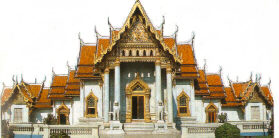|
|
|
|
THAILAND AT A GLANCE
The Marble Temple, Bangkok Thailand |
||
|
Three decades ago it could be said with presumed certainty that the Thais originated in Northwestern Szechuan in China about 4,500 years ago and later migrated down to their present homeland. However, this theory has been altered by the discovery of remarkable prehistoric artifacts in the village of Ban Chiang in the Nong Han District of Udon Thani Province in the Northeast. These include evidence of bronze metallurgy going back 3,500 years , as well as other indications of a far more sophisticated culture than any previously suspected by archaeologist. It now appears that the Thais might have originated here in Thailand and later scattered to various parts of Asia, including some parts of China. "Siam" is the name by which the country was know to the world until 1939 and again between 1945 and 1949. On May 11, 1949, and official proclamation changed the name of the country to "Prathet Thai", or "Thailand" by which it has since been known. The word "Thai" means "free" and therefore "Thailand" means "Land of the Free."
Not only does it have a history going back more than seven hundred years, but it also continues to function with extraordinary relevance and vitality in the contemporary world. Indeed, although the Revolution of 1932 brought an end to monarchy in its absolute form, the institution today can be said to be more powerful than ever in the sense of providing a unifying element for the country, a focal point that brings together people from all backgrounds and shades of political thought and gives them an intense awareness of being Thai. This was clearly shown by the unprecedented out pouring of public pride and personal affection that greeted the occasion in 1996 of His Majesty King Bhumibol Adulyadej’s becoming the longest-reigning monarch in the world. The 50th Anniversary Celebrations Of His Majesty's Accession To The Throne.
English, a mandatory subject in public school, is widely spoken and understood, particularly in Bangkok and other major cities.
|

